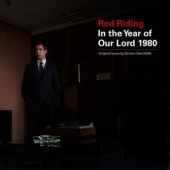
Hinchliffe Dickon
Red Riding: In The Year Of Our Lord 1980
Label: Blackest Ever Black
Genre: Electronica / Ambient / Experimental
Availability
- LP €19.99 In Stock
Blackest Ever Black presents the first vinyl edition of Dickon Hinchliffe's original score for 1980 - the second part of Channel 4 and Revolution Films' Red Riding trilogy, adapted by Tony Grisoni from David Peace's quartet of novels and first screened in 2009. Each film in the Red Riding trilogy, a landmark achievement in British television history, was helmed by a different director and had its own distinctive look, sound and feel. While Julian Jarrold's 1977 and Anand Tucker's 1983 were both marvellous, well-rounded pictures, James Marsh's1980 - photographed by Igor Martinovic on 35mm - somehow seemed to penetrate deeper, hit harder, and linger longer and more vividly in the memory. Described by Tony Grisoni as "an elegant steely trap", 1980's tragic arc is all the more devastating for the glimpses of lightness and redemption with which it taunts its hero - policeman Peter Hunter, played with astonishing grace and nuance by Paddy Considine. Warren Clarke, Maxine Peake, Peter Mullan, Tony Pitts, Jim Carter, David Morrissey, Sean Harris, Shaun Dooley and Lesley Sharp also figure in what surely ranks as one of the finest British ensemble casts ever assembled.
So yes, the acting, writing and direction are all first-rate, but crucial to the mesmeric, elegiac and ultimately pincering, punishing effect of 1980 is its music, composed by Dickon Hinchliffe and performed by a small string ensemble augmented with bass, piano, guitar and percussion. A founder member of Tindersticks, Hinchliffe has played a major role in the band's scores for the films of Claire Denis (including Vendredi Soir,Trouble Every Day and Nénette Et Boni), and since flying the roost has established himself as an arthouse and Hollywood composer of considerable renown, with credits including Forty Shades Of Blue, Project Nim, Winter's Bone and Rampart. Even more eloquently than Paddy Considine's note-perfect performance, Hinchliffe's music for 1980 articulates Hunter's journey from righteousness to ruin, his optimism gradually consumed by dread and paranoia. Even at its most tender, its most hopeful, its most soaringly romantic, the stench of death is all over it.
